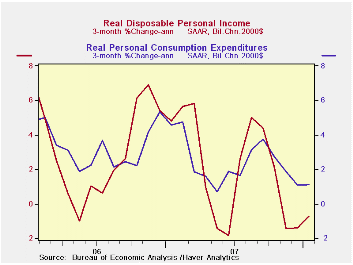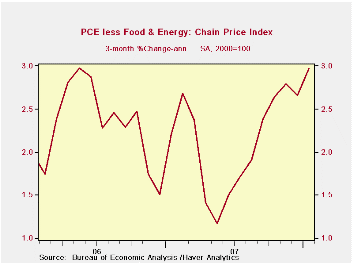 Global| Feb 29 2008
Global| Feb 29 2008U.S. Real Disposable Income Up 0.1%, Spending Flat, Core Price Gains Faster
by:Tom Moeller
|in:Economy in Brief
Summary
Adjusted for prices, disposable personal income squeaked out a 0.1% gain last month. The weak rise followed a like increase in December but two months of decline preceding that. It left the three-month growth rate at a negative 0.7% [...]

Adjusted for prices, disposable personal income squeaked out a 0.1% gain last month. The weak rise followed a like increase in December but two months of decline preceding that. It left the three-month growth rate at a negative 0.7% (AR).
Nominal personal income slightly beat Consensus expectations last month with a 0.3% rise and three-month growth in income held steady at a 4.1% annual rate. Wage & salary income rose 0.5% (4.1% y/y) after firm gains during the two prior months. Factory sector wages, however, were flat (+0.6% y/y) while wage & salary income in the private service-providing industries rose 0.5% (4.7% y/y). Wages in the government sector rose a strong 0.9% (4.7% y/y).
Lower interest rates caused the forth straight monthly decline in interest income (+5.2% y/y). That y/y increase was less than one third the rate of gain at the end of 2005. Dividend income rose another firm 0.5% (11.9% y/y), a double digit rate of gain that is down somewhat from its peak 16.3% in 2006.
Weakness in income growth caught up with personal spending. During the last two months, real personal consumption expenditures have been flat. As a result the three-month growth rate held at 1.1%, its lowest since last May. Nominal spending grew 0.4% which was double the expected increase.
Real spending on discretionary items weakened substantially led by a 3.3% (-5.3% y/y) drop in motor vehicle & parts purchases. Real spending on household furniture & appliances also fell 0.4% (+4.4% y/y) for the second consecutive month of decline. Spending on apparel did post a 0.3% (0.1% y/y) in January but that followed four months of either having been unchanged or down, including a 1.9% downdraft during December.
Spending in the less discretionary area continued to show growth. Medical care spending rose 0.2% (2.7% y/y) and spending on transportation services rose 0.2% (3.1% y/y). Spending on food, however, fell 0.2% (+0.7% y/y) during January. These and other detailed spending figures are available in Haver's USNA database.
The PCE chain price index rose a firm 0.4% lifted by higher energy prices. That raised the y/y gain to 3.7%, the quickest since mid-2005. The rise in the core PCE price index was ahead of expectations. A 0.3% gain beat expectations for a 0.2% rise but, more significant, was an acceleration in the three month growth rate to 3.0% that was its fastest since late 2001 and up by half from last year.
Overview: Monetary Policy and the Economic Outlook from the Federal Reserve's Monetary Report to Congress can be found here.
| Disposition of Personal Income | January | December | Y/Y | 2007 | 2006 | 2005 |
|---|---|---|---|---|---|---|
| Personal Income | 0.3% | 0.5% | 4.9% | 6.1% | 6.6% | 5.9% |
| Personal Consumption | 0.4% | 0.3% | 5.5% | 5.5% | 5.9% | 6.2% |
| Saving Rate | -0.1% | -0.1% | 0.6% (Jan. 07) | 0.4% | 0.4% | 0.5% |
| PCE Chain Price Index | 0.4% | 0.3% | 3.7% | 2.6% | 2.8% | 2.9% |
| Less food & energy | 0.3% | 0.2% | 2.2% | 2.1% | 2.2% | 2.2% |
Tom Moeller
AuthorMore in Author Profile »Prior to joining Haver Analytics in 2000, Mr. Moeller worked as the Economist at Chancellor Capital Management from 1985 to 1999. There, he developed comprehensive economic forecasts and interpreted economic data for equity and fixed income portfolio managers. Also at Chancellor, Mr. Moeller worked as an equity analyst and was responsible for researching and rating companies in the economically sensitive automobile and housing industries for investment in Chancellor’s equity portfolio. Prior to joining Chancellor, Mr. Moeller was an Economist at Citibank from 1979 to 1984. He also analyzed pricing behavior in the metals industry for the Council on Wage and Price Stability in Washington, D.C. In 1999, Mr. Moeller received the award for most accurate forecast from the Forecasters' Club of New York. From 1990 to 1992 he was President of the New York Association for Business Economists. Mr. Moeller earned an M.B.A. in Finance from Fordham University, where he graduated in 1987. He holds a Bachelor of Arts in Economics from George Washington University.
More Economy in Brief
 Global| Feb 05 2026
Global| Feb 05 2026Charts of the Week: Balanced Policy, Resilient Data and AI Narratives
by:Andrew Cates






